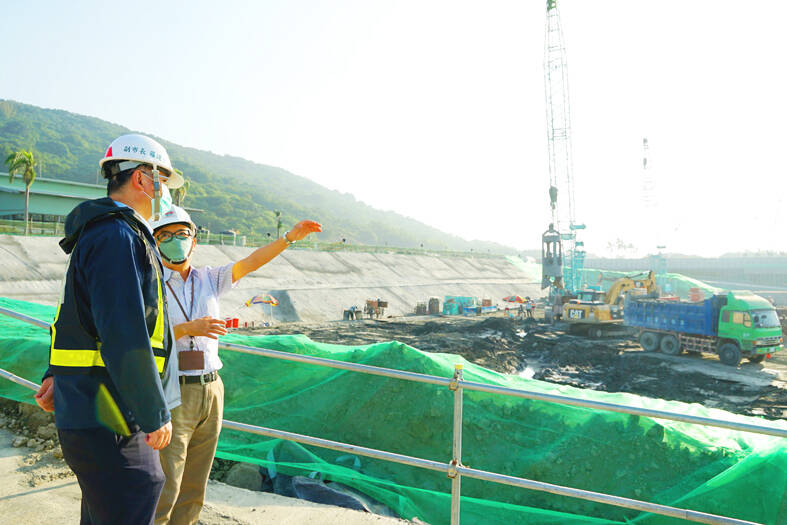Taiwan Semiconductor Manufacturing Co (TSMC, 台積電) yesterday said that construction of a factory in Kaohsiung to produce 28-nanometer chips is under way, with mass production set to start in 2024.
TSMC, the world’s largest contract chipmaker, made the announcement after reports about the company’s capacity expansion plans in Kaohsiung.
Industry insiders said that TSMC on Friday awarded the contract to build the new fab to Fu Tsu Construction Co (互助營造).

Photo courtesy of Kaohsiung Economic Development Bureau
The chipmaker, a major Apple Inc supplier, did not directly respond to the reports, saying only that construction had started following the completion of land grading.
TSMC previously said it intended to build a 7-nanometer and a 28-nanometer fab in Kaohsiung’s new Nanzih Technology Industrial Park (楠梓科技產業園區).
However, the chipmaker earlier this month said it was postponing construction of the 7-nanometer fab in response to weak demand, but said it would still build the 28-nanometer factory.
Starting in the fourth quarter of this year, the capacity utilization of 7-nanometer and 6-nanometer chips would not be as high as over the past three years, TSMC chief executive officer C.C. Wei (魏哲家) told an investors’ conference on Oct. 13.
At the conference, the chipmaker also said it would cut its capital expenditure budget for this year to US$36 billion from its previous estimate of US$40 billion to US$44 billion.
Nanzih Technology Industrial Park is on the site of the former Kaohsiung Refinery (高雄煉油廠) operated by state-owned oil refiner CPC Corp, Taiwan (台灣中油).
TSMC also declined to comment on media reports that it would replace Samsung Electronics Co as the manufacturer of next-generation assisted driving chips for Tesla Inc, the world’s leading electric vehicle maker.
Shares in TSMC fell 1.03 percent to close at NT$482 yesterday, as some investors sought to cash in their holdings after recent gains.
Its share price soared 10.31 percent last week on news that Berkshire Hathaway Inc had bought more than US$4.1 billion in TSMC’s American depositary receipts as of the end of September.
That came after a 15.6 percent rise in the stock from Nov. 7 to Nov. 11.
Warren Buffett’s conglomerate has not commented publicly on the deal, but market watchers attribute the purchase to TSMC’s cheap valuations, technology leadership and solid fundamentals.
“TSMC fell victim to today’s selling as the stock was moving closer to the nearest level of technical resistance at NT$500 after a recent rally,” Concord Securities Co (康和證券) analyst Kerry Huang (黃志祺) said. “But I have to say that TSMC’s long term prospects remain sound despite short-term market uncertainty.”

MULTIFACETED: A task force has analyzed possible scenarios and created responses to assist domestic industries in dealing with US tariffs, the economics minister said The Executive Yuan is tomorrow to announce countermeasures to US President Donald Trump’s planned reciprocal tariffs, although the details of the plan would not be made public until Monday next week, Minister of Economic Affairs J.W. Kuo (郭智輝) said yesterday. The Cabinet established an economic and trade task force in November last year to deal with US trade and tariff related issues, Kuo told reporters outside the legislature in Taipei. The task force has been analyzing and evaluating all kinds of scenarios to identify suitable responses and determine how best to assist domestic industries in managing the effects of Trump’s tariffs, he

TIGHT-LIPPED: UMC said it had no merger plans at the moment, after Nikkei Asia reported that the firm and GlobalFoundries were considering restarting merger talks United Microelectronics Corp (UMC, 聯電), the world’s No. 4 contract chipmaker, yesterday launched a new US$5 billion 12-inch chip factory in Singapore as part of its latest effort to diversify its manufacturing footprint amid growing geopolitical risks. The new factory, adjacent to UMC’s existing Singapore fab in the Pasir Res Wafer Fab Park, is scheduled to enter volume production next year, utilizing mature 22-nanometer and 28-nanometer process technologies, UMC said in a statement. The company plans to invest US$5 billion during the first phase of the new fab, which would have an installed capacity of 30,000 12-inch wafers per month, it said. The

‘SWASTICAR’: Tesla CEO Elon Musk’s close association with Donald Trump has prompted opponents to brand him a ‘Nazi’ and resulted in a dramatic drop in sales Demonstrators descended on Tesla Inc dealerships across the US, and in Europe and Canada on Saturday to protest company chief Elon Musk, who has amassed extraordinary power as a top adviser to US President Donald Trump. Waving signs with messages such as “Musk is stealing our money” and “Reclaim our country,” the protests largely took place peacefully following fiery episodes of vandalism on Tesla vehicles, dealerships and other facilities in recent weeks that US officials have denounced as terrorism. Hundreds rallied on Saturday outside the Tesla dealership in Manhattan. Some blasted Musk, the world’s richest man, while others demanded the shuttering of his

Taiwan’s official purchasing managers’ index (PMI) last month rose 0.2 percentage points to 54.2, in a second consecutive month of expansion, thanks to front-loading demand intended to avoid potential US tariff hikes, the Chung-Hua Institution for Economic Research (CIER, 中華經濟研究院) said yesterday. While short-term demand appeared robust, uncertainties rose due to US President Donald Trump’s unpredictable trade policy, CIER president Lien Hsien-ming (連賢明) told a news conference in Taipei. Taiwan’s economy this year would be characterized by high-level fluctuations and the volatility would be wilder than most expect, Lien said Demand for electronics, particularly semiconductors, continues to benefit from US technology giants’ effort